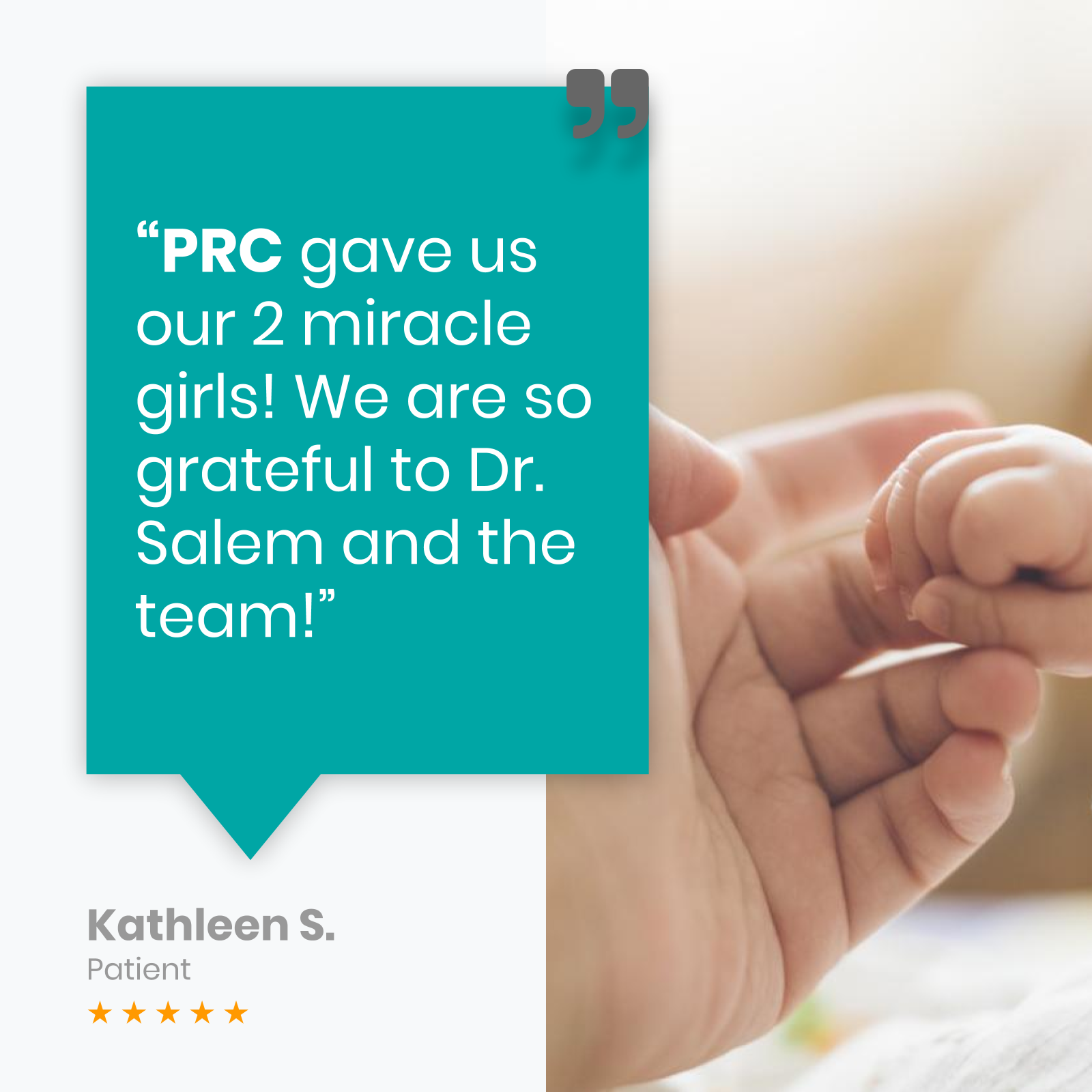Pacific Reproductive Center is committed to providing the highest standard of care to women struggling with polycystic ovary syndrome (PCOS) and pregnancy difficulties. Our multidisciplinary team of fertility specialists works together to create individualized treatment plans that meet each patient’s unique needs.
Polycystic ovary syndrome (PCOS) is a hormonal disorder that affects an estimated 8-13 percent of women globally, according to the World Health Organization. It is among the leading causes of infertility.
PCOS can be managed, though not cured. The proper interventions and lifestyle modifications can significantly improve reproductive outcomes, nevertheless.
What is Polycystic Ovary Syndrome?
Polycystic ovarian syndrome disease (PCOS) is a complex reproductive condition characterized by a hormonal imbalance that can cause a variety of symptoms. This hormonal imbalance affects various parts of the body, including the ovaries, adrenal glands, and pituitary gland.
Women with PCOS may have irregular menstrual cycles or no periods at all. They may also experience acne, weight gain, and excessive hair growth. The condition can also affect fertility, resulting in difficulty getting pregnant.
PCOS causes the development of multiple fluid-filled ovarian follicles, also known as cysts, outside of one or both ovaries. This condition hinders the normal functioning of the ovaries and disrupts the menstrual cycle.
Polycystic Ovary Syndrome Symptoms
While PCOS symptoms generally begin at the onset of menstruation, they can occur at any age during adolescence or full adulthood. PCOS is characterized by a combination of symptoms that can have a significant impact on a woman’s overall health. Common symptoms include the following:
Irregular Menstruation
One of the primary symptoms is menstrual irregularity. Women may experience infrequent or prolonged menstrual cycles, also known as oligomenorrhea or amenorrhea. This irregularity can lead to difficulties in predicting when a woman is ovulating, making it challenging to conceive naturally.
Excess Facial or Body Hair
This condition, known as hirsutism, is the presence of excessive hair growth in areas such as the face, chest, back, and buttocks. It is caused by increased levels of androgens (male hormones) in the body.
Acne
Oily skin or acne is also common among women with PCOS. The hormonal imbalances associated with the condition can contribute to increased oil production in the skin, leading to acne breakouts. Acne can occur on the face, chest, and back, and it may be more persistent or severe in women with PCOS compared to women without the condition.
Abdominal Weight Gain
Abdominal fat accumulation is another characteristic of PCOS. Women with PCOS often have a higher body mass index (BMI) and a higher percentage of body fat compared to women without the condition. This excess fat distribution, specifically around the midsection, can lead to an increased risk of developing metabolic disorders such as insulin resistance and type 2 diabetes.
Reproductive Challenges
Infertility is another significant concern for women with PCOS. The hormonal imbalances and ovarian dysfunction associated with PCOS can make it challenging to conceive naturally. Women with PCOS may experience irregular ovulation, reduced fertility, or reduced chances of carrying a pregnancy to term. However, with proper medical intervention and support, fertility treatments such as ovulation induction and assisted reproductive technologies (ART) may help overcome fertility challenges.
It is important to note that not all women with PCOS experience the same set of symptoms. The severity and combination of symptoms can vary greatly.
How do you diagnose polycystic ovarian syndrome?
A formal diagnosis for polycystic ovarian syndrome (PCOS) is necessary to ensure appropriate medical interventions. The symptoms of PCOS can mimic those of other disorders, making it important to undergo a thorough examination to determine the underlying cause.
Medical History and Examination
Your healthcare provider will ask you about your medical history, including questions about your menstrual cycle, weight gain, and any family history of PCOS or hormonal disorders. They will also perform a pelvic exam to assess the size and appearance of the ovaries and uterus.
Blood Tests
To diagnose PCOS, your healthcare provider may order blood tests to check for elevated levels of androgens (male hormones). High androgen levels can disrupt normal ovulation and contribute to other symptoms, such as acne, excessive hair growth, and hair loss.
Polycystic Ovary Syndrome Ultrasound Test
An ultrasound test may be performed to visualize the ovaries and check for the presence of cysts. Ultrasound is a non-invasive procedure that uses sound waves to create images of internal structures. This test can help determine if the ovaries are enlarged and if there are any visible cysts.
Polycystic Ovary Syndrome Causes and Risk Factors
It is believed that an assortment of hereditary, hormonal, and lifestyle factors contribute to the occurrence of PCOS. However, the exact cause is unknown. Risk factors include the following:
- Family history: PCOS is known to run in families, suggesting that genetics might play a role.
- Insulin resistance: Insulin resistance is a condition in which the body’s insulin response is impaired, causing elevated blood sugar. This resistance can contribute to the hormonal imbalances and weight gain associated with PCOS.
- Metabolic syndrome: PCOS is often accompanied by other conditions like obesity, high blood pressure, and high blood sugar levels that collectively fall under the term metabolic syndrome.
How to Treat Polycystic Ovary Syndrome (PCOS)
Although PCOS cannot be cured, multiple therapies and lifestyle adjustments can dramatically improve symptoms and enhance reproductive outcomes.
Lifestyle Modifications
For many women, lifestyle modifications are an essential part of mitigating PCOS symptoms. Some common lifestyle changes include the following:
- Healthy Diet: A diet that emphasizes fruits, vegetables, whole grains, and lean proteins is recommended for women with PCOS. This diet can help regulate blood sugar levels, improve insulin sensitivity, and reduce inflammation.
- Exercise: Regular physical activity, such as cardiovascular exercise and strength resistance training, can improve insulin sensitivity and reduce body weight. Exercise can also improve menstrual cycle regularity.
- Stress Management: Stress can have a negative impact on hormonal balance and fertility. Techniques such as yoga, meditation, and counseling can help reduce stress levels and enhance feelings of well-being.
Medications
Medications are often prescribed as part of treatment for polycystic ovary syndrome (PCOS) and pregnancy challenges. Two commonly used interventions include the following:
- Progestin Therapy: Progestin therapy is often prescribed to regulate menstrual cycles. It can help restore normal menstrual cycles, reduce the risk of endometrial cancer, and improve fertility.
- Clomiphene: Clomiphene is a medication that stimulates ovulation and can help improve fertility. It is typically prescribed to women who do not ovulate regularly or do not respond to other fertility treatments.
Assisted Reproductive Treatments
- IUI or IVF Treatment: For women with PCOS who are trying to conceive, intrauterine insemination (IUI) or in vitro fertilization (IVF) may be recommended to enhance fertility.
PCOS Treatment and Fertility Solutions: PRC Offers Personalized Reproductive Treatment in CA
Pacific Reproductive Center is a trusted medical facility committed to easing the challenges of women struggling with polycystic ovary syndrome (PCOS) and pregnancy difficulties.
With our dedicated team of highly compassionate, skilled, and experienced medical professionals, PRC provides comprehensive reproductive treatments tailored to each patient’s specific circumstances.
Start your journey today.
Treatments
Pacific Reproductive Center has been successfully aiding conception for over two decades. We optimize the conditions of fertility treatment to give every potential parent the greatest chance of successful childbirth.
Resources
We ensure that every patient fully understands their medical condition and treatment options available to them. We understand each patient is unique so we help guide you through the best option to support your own fertility journey.
Looking for the Best Fertility Clinic in Southern California?
Pacific Reproductive Center has four convenient locations throughout Southern California, making it easy for patients to receive quality care close to home. Each IVF fertility center has an on-site lab, next-generation services, and state-of-the-art equipment.
Whether in Glendale, Torrance, Irvine, or Corona, our world-class fertility doctors can help you build the family you’ve always wanted.
3720 Lomita Blvd, Suite 200 Torrance, CA 90505
116 E. Broadway, Suite 300 Glendale, CA 91205
10 Post Irvine, CA 92618
381 Corporate Terrace Corona, CA 92879




